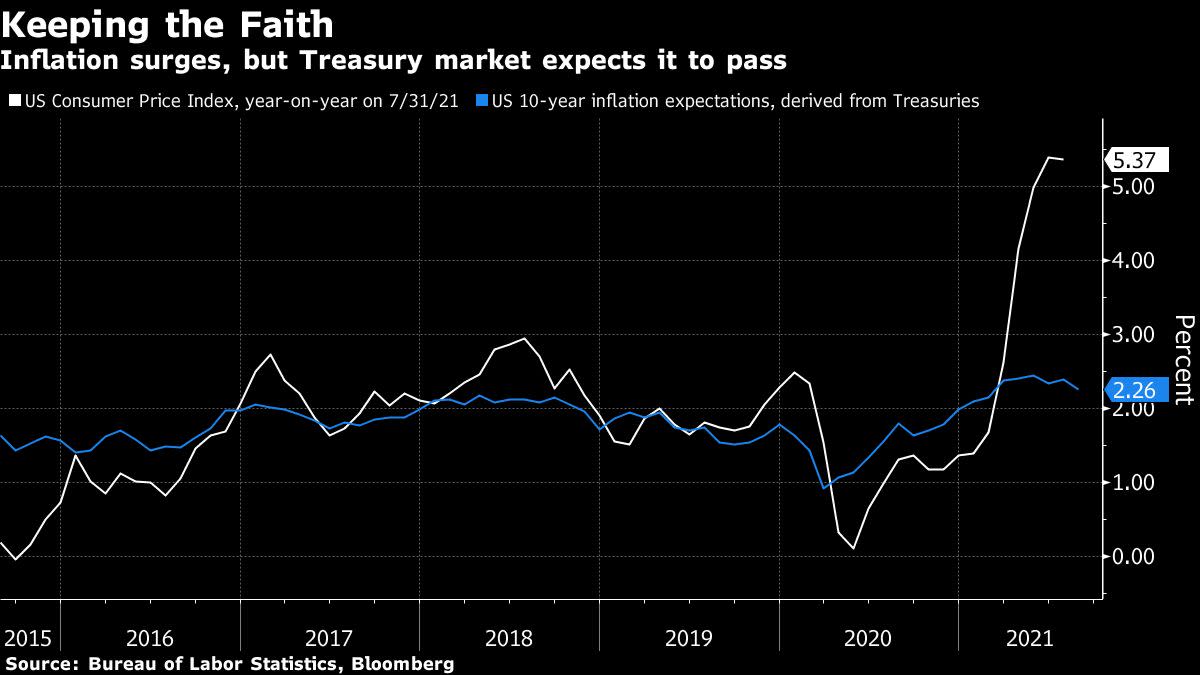Powell’s Second-Term Chances Rise With Key Yellen Endorsement

(Bloomberg) — Jerome Powell’s chances for a second term as Federal Reserve chair gained momentum with Treasury Secretary Janet Yellen’s endorsement, a move that would reduce uncertainty about the path for monetary policy amid risks from inflation and the delta variant.
Yellen has told senior White House advisers that she favors renominating Powell, whose current term ends in February, according to people familiar with the matter. President Joe Biden hasn’t decided yet and is likely to make his choice around Labor Day, which falls on Sept. 6 this year, the people said.
Her support, reported Saturday, offers Powell an enormous boost — given both the weight of her position as Treasury chief and her personal stature having run the Fed herself for four years, capping a central banking career that spanned almost two decades.
Still, Fed governor Lael Brainard maintains some support inside the administration for the Fed chair job, according to one person familiar with the matter. The former Obama-era official, who Biden last year considered for Treasury secretary, has the support of progressive Democrats, many of who are working across the Biden team.
“One of the great benefits of keeping Powell on as chair is continuity,” said Derek Tang, economist at Monetary Policy Analytics. “That’s very reassuring in a time of such uncertainty. He is a steady hand. The markets see him that way and that’s why it helps.”
Powell’s nomination for a fresh term would need confirmation in the Senate, where there’s a 50-50 partisan split. GOP senators have in recent weeks backed the current chair, who served as a governor at the Fed from 2012 until being elevated in 2018, when then-President Donald Trump passed over Yellen for her own second term.
Yellen’s endorsement comes at an important time. Powell will deliver a much-anticipated virtual speech on Friday at the Federal Reserve Bank of Kansas City’s annual Jackson Hole symposium — possibly signaling when and how the central bank is likely to begin withdrawing some of its extraordinary support for the economy.
“This is a great opportunity for him to showcase his consensus building skills,” Tang said. Powell will have a chance to show the White House and others how he’s threading the needle within his own committee, given their different views on when to start pulling back support for the economy.
Powell and his colleagues have been applying a new policy framework — announced at Jackson Hole last year — which alters a previous approach of raising interest rates to contain inflation based on expectations for job and economic growth rather than outcomes. Investors have been debating the appropriateness of the strategy at a time of major pandemic-triggered disruptions to supply chains and the job market. Putting a new Fed chief in place in February could heighten uncertainty in markets.
Critics, including Republicans and even some Democrats, have said the Fed is at risk of letting inflation get out of control for the first time in more than 30 years. They have urged Powell to begin pulling back on the Fed’s massive bond purchases, which help stimulate the economy by suppressing long-term borrowing costs.
“Monetary policy is at a critical juncture,” Deutsche Bank AG economists led by Peter Hooper, who previously worked at the Fed, wrote in a note to clients this month. Replacing Powell with someone more dovish “could prove counterproductive, as it could lead to an increase in perceived inflation risks, higher bond yields and weaker risk sentiment — all of which would delay the return of the economy to its pre-pandemic state.”
Brainard Option
Biden administration officials have been studying speeches and commentary by Brainard, who’s seen as a more liberal nominee who hews closer to Biden’s economic agenda and is far more of a hawk on banking regulations. Nominating Brainard would win praise from progressive Democratic senators, but it would set up a bruising confirmation fight — potentially even a 50-50 vote in the Senate with Vice President Kamala Harris the tie-breaker.
While many senior Democrats have praised Powell, unified Democratic support isn’t a foregone conclusion. Senators Sherrod Brown and Elizabeth Warren have declined to say whether they would back him for another term, with both criticizing Powell’s handling of financial regulations on issues like bank-stock buybacks.
Several other openings are pending on the governing board, giving Biden a chance to put his stamp on the Fed and remake it after Trump’s five picks.
Besides Powell, Biden has the opportunity to replace the vice chair for supervision, who oversees bank regulations, a position now held by Randal Quarles and the vice chair post now held by Richard Clarida, along with an open seat on the Fed board.
Inflation Readings
Meantime, inflation — an economic phenomenon that barely registered in American politics for 40 years — represents a vulnerability in the 2022 midterm elections.
The most recent readings remain elevated: the consumer price index rose 5.4% in the 12 months through July, though it fell from the previous month for the first time since November.
The concerns revealed themselves this month when data showed that consumer sentiment fell in early August to the lowest level in almost a decade by one measure and U.S. retail sales slid in July by more than forecast.
“Inflation-linked assets should benefit significantly” if Brainard were nominated as Fed chair, Wells Fargo & Co. analysts including Mike Schumacher, head of macro strategy, wrote this month. They predicted a widening gap in yields between inflation-linked Treasuries and regular ones following such news.
The Wells Fargo team also said, however, “To be clear, we and the online markets still expect Powell to retain his seat.”
More stories like this are available on bloomberg.com
Subscribe now to stay ahead with the most trusted business news source.
©2021 Bloomberg L.P.




